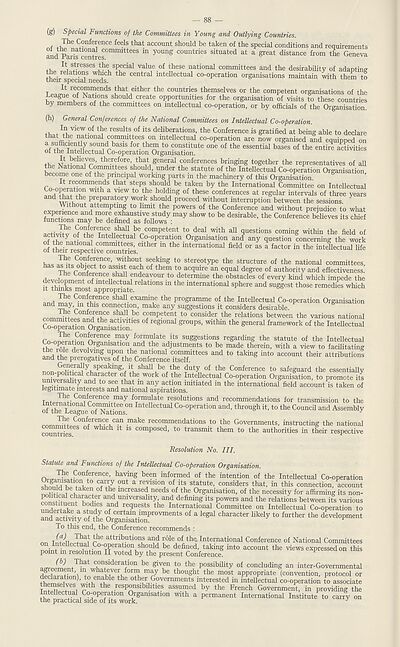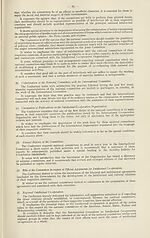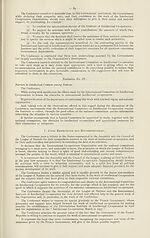International > Proceedings of the second General conference of national committees on intellectual co-operation, Paris, July 5th-9th, 1937
(90)
Download files
Complete book:
Individual page:
Thumbnail gallery: Grid view | List view

— 88
(g) Special Functions of the Committees in Young and Outlying Countries.
, , J116 C?nference feels that account should be taken of the special conditions and requirements
and Pads ien^esCOmmitteeS ^ y°Ung COUntries situated at a great distance from the Geneva
Iti s,tresses special value of these national committees and the desirability of adapting
their spe^k^n^ds11 ^ Central intellectual co-operation organisations maintain with them to
It recommends that either the countries themselves or the competent organisations of the
League of Nations should create opportunities for the organisation of visits to these countries
by members of the committees on intellectual co-operation, or by officials of the Organisation.
(h) General Conferences of the National Committees on Intellectual Co-operation.
+ fn view of the results of its deliberations, the Conference is gratified at being able to declare
*atl0nal committees on intellectual co-operation are now organised and equipped on
a sufficient y sound basis for them to constitute one of the essential bases of the entire activities
of the Intellectual Co-operation Organisation.
thp ther(;fore> that general conferences bringing together the representatives of all
Committees should under the statute of the Intellectual-Co-operation Organisation,
become one of the principal working parts in the machinery of this Organisation.
It recommends that steps should be taken by the International Committee on Intellectual
andThafthp t0 °f theSe conferences at regular intervals of three years
d P^Paratory work should proceed without interruption between the sessions.
Without attempting to limit the powers of the Conference and without prejudice to what
fuSnsmay ^ t0 ** deSirable' the Conferen“ ^ chief
activltv6 /f0tit-r<r!,,;»i|Shfl ^ comPet™t to deal with all questions coming within the field of
a-ctivdy of the Intellectual Co-operation Organisation and any question concerning the work
of ILeirn"ti~“teS either in the internationaI fidd - - a ^tor in the indlectual life
has aids ohierrtTn!;„TithOUl TSng ^ stere0type the structure of the national committees,
has as its object to assist each of them to acquire an equal degree of authority and effectiveness.
Ihe Conference shall endeavour to determine the obstacles of every kind which impede the
ft IwXmosf Appropriate t,0nS “ international sPhere and sugg^t ‘hose remedies which
and m^v^hi!1106 ^ examme the programme of the Intellectual Co-operation Organisation
and may, m this connection, make any suggestions it considers desirable.
e Conference shall be competent to consider the relations between the various national
Co^jieralion Organisation1GS ^ regi°nal groups’ within the general framework of the Intellectual
Co oneOt^r6 Tay f0rin+U1}ateJ!ts suggestions regarding the statute of the Intellectual
thP Sp 0 P^msation and the adjustments to be made therein, with a view to facilitating
LdthPn"1^ uPmi+,th^ natl°nal committees and to taking into account their attributions
and the prerogatives of the Conference itself.
Ge,"f-raI.lytSpeaking’ sha11 be the duty of the Conference to safeguard the essentially
mfversAjhv aCnHaitaCter tw' WOrk the Intellectual Co-operation Organisation, to promote its
WiTfA3 t ty f d ! Sej that m ;my .actl.on initiated in the international field account is taken of
legitimate interests and national aspirations.
Tn+Pr!io+1-pC01?rrenCe-+fiay f°rinulate resolutions and recommendations for transmission to the
oft“gtCo“ Intellectual Co-operation and, through it, to the Council and Assembly
rnrr1m,1fipCOnffere •make recomniendations to the Governments, instructing the national
countries °f WhlCh ^ 13 composed> to transmit them to the authorities in their respective
Resolution No. III.
Statute and Functions of the Intellectual Co-operation Organisation.
Oraallt6 haAlmg be<^ informed of the intention of the Intellectual Co-operation
Sioffid hP tfJ0 a re71S10Ii °fj;itf Statute’ considers that, in this connection/account
oe faken of the increased needs of the Organisation, of the necessity for affirming its non-
constiWn^Wr 1 and universalltyi and defining its powers and the relations between its various
nndpr^kpi ^ f ^uests the fnternational Committee on Intellectual Co-operation to
“fart^trof thrOrCglnfsTtioTr°VmentS ^ ^ likdy t0 further the d-elopment
To this end, the Conference recommends :
nn T^upl^ ?e attributions and role of thq. International Conference of National Committees
ooint in^esoffiGn^ITera^Ti.Sh^ld be defiued' taking into account the views expressed on this
point m resolution II voted by the present Conference.
aereemPnt^^wW1^1^1011 be Siv^n ^ the possibility of concluding an inter-Governmental
dfclaratffinl to^bWh^1^ °e thougnt the most appropriate (convention, protocol or
declaration), to enable the other Governments interested in intellectual co-operation to associate
“r3! Wr the+respXnsiblbties assumed by the French Government, in providing the
tellectual Co-operation Organisation with a permanent International Institute to carry on
the practical side of its work. ^
(g) Special Functions of the Committees in Young and Outlying Countries.
, , J116 C?nference feels that account should be taken of the special conditions and requirements
and Pads ien^esCOmmitteeS ^ y°Ung COUntries situated at a great distance from the Geneva
Iti s,tresses special value of these national committees and the desirability of adapting
their spe^k^n^ds11 ^ Central intellectual co-operation organisations maintain with them to
It recommends that either the countries themselves or the competent organisations of the
League of Nations should create opportunities for the organisation of visits to these countries
by members of the committees on intellectual co-operation, or by officials of the Organisation.
(h) General Conferences of the National Committees on Intellectual Co-operation.
+ fn view of the results of its deliberations, the Conference is gratified at being able to declare
*atl0nal committees on intellectual co-operation are now organised and equipped on
a sufficient y sound basis for them to constitute one of the essential bases of the entire activities
of the Intellectual Co-operation Organisation.
thp ther(;fore> that general conferences bringing together the representatives of all
Committees should under the statute of the Intellectual-Co-operation Organisation,
become one of the principal working parts in the machinery of this Organisation.
It recommends that steps should be taken by the International Committee on Intellectual
andThafthp t0 °f theSe conferences at regular intervals of three years
d P^Paratory work should proceed without interruption between the sessions.
Without attempting to limit the powers of the Conference and without prejudice to what
fuSnsmay ^ t0 ** deSirable' the Conferen“ ^ chief
activltv6 /f0tit-r<r!,,;»i|Shfl ^ comPet™t to deal with all questions coming within the field of
a-ctivdy of the Intellectual Co-operation Organisation and any question concerning the work
of ILeirn"ti~“teS either in the internationaI fidd - - a ^tor in the indlectual life
has aids ohierrtTn!;„TithOUl TSng ^ stere0type the structure of the national committees,
has as its object to assist each of them to acquire an equal degree of authority and effectiveness.
Ihe Conference shall endeavour to determine the obstacles of every kind which impede the
ft IwXmosf Appropriate t,0nS “ international sPhere and sugg^t ‘hose remedies which
and m^v^hi!1106 ^ examme the programme of the Intellectual Co-operation Organisation
and may, m this connection, make any suggestions it considers desirable.
e Conference shall be competent to consider the relations between the various national
Co^jieralion Organisation1GS ^ regi°nal groups’ within the general framework of the Intellectual
Co oneOt^r6 Tay f0rin+U1}ateJ!ts suggestions regarding the statute of the Intellectual
thP Sp 0 P^msation and the adjustments to be made therein, with a view to facilitating
LdthPn"1^ uPmi+,th^ natl°nal committees and to taking into account their attributions
and the prerogatives of the Conference itself.
Ge,"f-raI.lytSpeaking’ sha11 be the duty of the Conference to safeguard the essentially
mfversAjhv aCnHaitaCter tw' WOrk the Intellectual Co-operation Organisation, to promote its
WiTfA3 t ty f d ! Sej that m ;my .actl.on initiated in the international field account is taken of
legitimate interests and national aspirations.
Tn+Pr!io+1-pC01?rrenCe-+fiay f°rinulate resolutions and recommendations for transmission to the
oft“gtCo“ Intellectual Co-operation and, through it, to the Council and Assembly
rnrr1m,1fipCOnffere •make recomniendations to the Governments, instructing the national
countries °f WhlCh ^ 13 composed> to transmit them to the authorities in their respective
Resolution No. III.
Statute and Functions of the Intellectual Co-operation Organisation.
Oraallt6 haAlmg be<^ informed of the intention of the Intellectual Co-operation
Sioffid hP tfJ0 a re71S10Ii °fj;itf Statute’ considers that, in this connection/account
oe faken of the increased needs of the Organisation, of the necessity for affirming its non-
constiWn^Wr 1 and universalltyi and defining its powers and the relations between its various
nndpr^kpi ^ f ^uests the fnternational Committee on Intellectual Co-operation to
“fart^trof thrOrCglnfsTtioTr°VmentS ^ ^ likdy t0 further the d-elopment
To this end, the Conference recommends :
nn T^upl^ ?e attributions and role of thq. International Conference of National Committees
ooint in^esoffiGn^ITera^Ti.Sh^ld be defiued' taking into account the views expressed on this
point m resolution II voted by the present Conference.
aereemPnt^^wW1^1^1011 be Siv^n ^ the possibility of concluding an inter-Governmental
dfclaratffinl to^bWh^1^ °e thougnt the most appropriate (convention, protocol or
declaration), to enable the other Governments interested in intellectual co-operation to associate
“r3! Wr the+respXnsiblbties assumed by the French Government, in providing the
tellectual Co-operation Organisation with a permanent International Institute to carry on
the practical side of its work. ^
Set display mode to:
![]() Universal Viewer |
Universal Viewer | ![]() Mirador |
Large image | Transcription
Mirador |
Large image | Transcription
Images and transcriptions on this page, including medium image downloads, may be used under the Creative Commons Attribution 4.0 International Licence unless otherwise stated. ![]()
| League of Nations > International > Proceedings of the second General conference of national committees on intellectual co-operation, Paris, July 5th-9th, 1937 > (90) |
|---|
| Permanent URL | https://digital.nls.uk/195218345 |
|---|
| Shelfmark | LN.XII |
|---|
| Description | Over 1,200 documents from the non-political organs of the League of Nations that dealt with health, disarmament, economic and financial matters for the duration of the League (1919-1945). Also online are statistical bulletins, essential facts, and an overview of the League by the first Secretary General, Sir Eric Drummond. These items are part of the Official Publications collection at the National Library of Scotland. |
|---|---|
| Additional NLS resources: |
|

